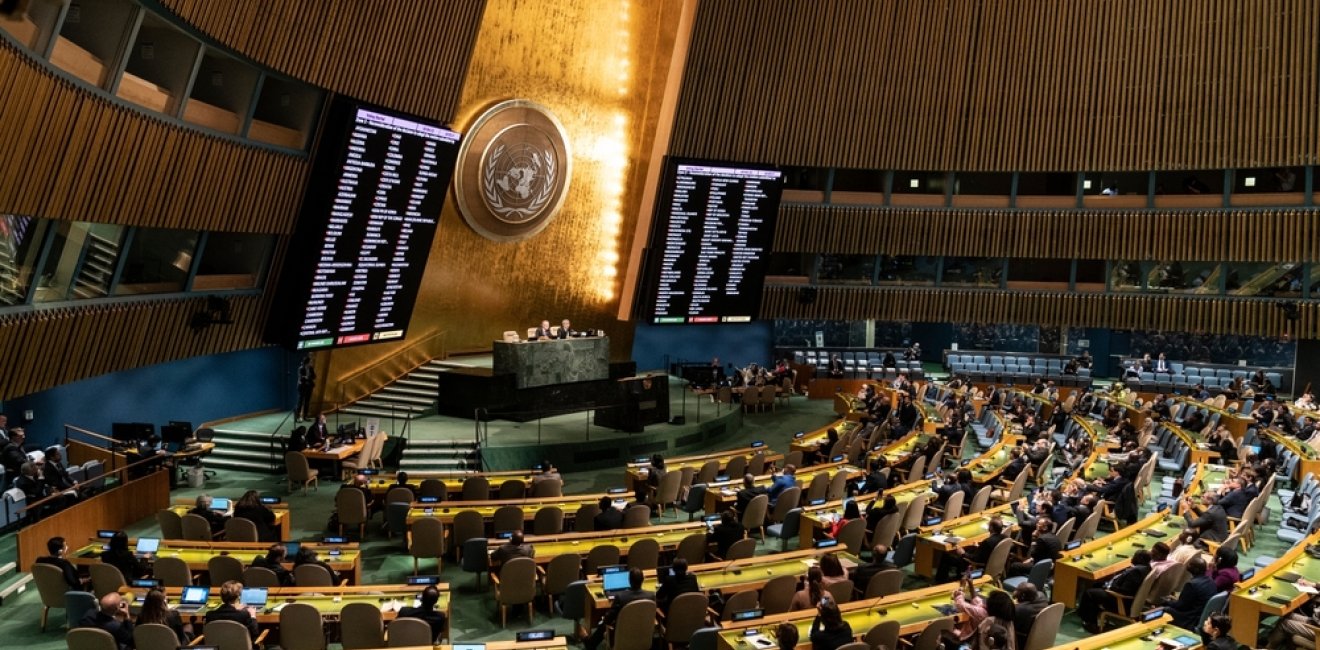Without a sea-change in the makeup of the policy table, there remains untapped potential for breakthroughs in the longstanding conflict, with devastating regional and global impacts.
Women’s voices have been woefully absent from the policy table over rising conflicts in the Middle East, particularly Gaza. We are approaching the 25th anniversary of the United Nations’ Women, Peace and Security (WPS) Agenda, which called for greater recognition of the distinct impacts of conflict on women alongside the importance of their roles in enabling peace. Despite the proliferation of National Action Plans on WPS in most countries, the agenda has faced poor implementation and ongoing roadblocks 24 years later.
This failure to include women is stunting the potential for peace, and the international community is partially to blame. The US, UN, and other powers that have long promoted women’s inclusion in peace processes are failing to push warring parties to live up to their commitments and to promote women leaders within their own ranks. These failures could be undercutting peace prospects by at least 20%. Without meaningful work to advance this agenda, the potential for peace remains bleak.
Women peacebuilding in MENA
In today’s major conflicts, including those in Yemen, Sudan, and Gaza, women are significantly underrepresented at the policy table. The national leaders and negotiators in these conflicts are almost exclusively male. This should be alarming given the evidence that when peace efforts include women, they are more likely to last.
Studies of peace processes throughout history have found that the meaningful inclusion of women in peace negotiations increases the likelihood of agreements lasting by at least two years by 20% and for 15 years by 35%. Historians credit the inclusion of women in peace processes in Colombia and Northern Ireland, for example, as critical factors enhancing peace outcomes.
In Israel and Gaza, women’s underrepresentation remains an ongoing yet underrecognized roadblock to peace. Decades of conflict have ravaged families, with rising levels of concern for women in Gaza. Conflict harms both women and men but has specific gendered effects. Israel’s attacks in Gaza have destroyed health facilities and advanced obstetric violence, with specific impacts on mothers and children. Reports of sexual violence and abuse committed by Hamas against Israeli hostages alongside reports of sexual abuses perpetrated by Israeli forces in Gaza have raised substantial alarm.
Facing these horrors, women’s groups in the areas affected by conflict have been active for decades. Israeli group Women Wage Peace and Palestinian group Women of the Sun have been active peace advocates, co-producing a joint statement for peace, “A Mother’s Call.” Palestinian women’s group MIFTAH advanced recommendations for women’s inclusion in peace efforts in 2010 that have largely remained unrealized. Initiatives like the 1325 project promote qualified women leaders, but negotiations remain dominated by men—just as they have been historically.
Women’s leadership everywhere
Women leaders do not guarantee peace. Essentializing women’s leadership as inherently “peaceful” does not capture the diversity of women’s experiences, including as perpetrators and preventors of violence. But demanding inclusive processes that address the links between gender inequality and conflict is a strategy that reduces the drivers of violence—a win for a range of outcomes for peace and stability.
One reason why the WPS Agenda is faltering in places it is needed most is because powers promoting the agenda are failing to practice what they preach on women’s inclusion. This advances an ongoing double standard and undermines the potential for role modelling effects and political pressure that could change the game for peace. Studies show that women political leaders can have a domino effect, motivating parties to elect or appoint women or women to become involved in politics. The underrepresentation of women in the ranks of the agenda’s main proponents makes commitments to WPS appear disingenuous and hollow.
The UN, the primary advocate for its Resolution 1325, is yet to have a woman at its helm as Secretary-General, a trend more international leaders are suggesting must soon reverse. In the US, analysts criticize the government of paying lip service to the agenda without incorporating it into its own affairs. Famous images of all-male tables during the Oslo Accords and Abraham Accords demonstrate the historic invisibility of women in internationally-led negotiations.
Increasing women’s voices in peace efforts in the region is not beyond reach. The region has been home to prominent female leaders, despite waning numbers today. Women such as Tzipi Livni, Israeli politician and Israel’s chief negotiator between 2007 and 2014, and Hanan Ashrawi, a Palestinian Liberation Organization chief negotiator in the 1990s, played important roles in past peace efforts.
Golda Meir served as Israel’s fourth and only woman prime minister. While her leadership saw the eruption of the 1973 Arab-Israeli War, it challenged prevailing norms about masculine leadership that have worsened since. But today, Israeli leadership is primarily male. Women’s representation waned under Netanyahu’s leadership to less than 30% of the Knesset alongside a relatively low number of female ministers. Still, some see the nation’s history of female leadership and its longstanding inclusion of women in its compulsory military program, including Israeli women’s recent combat roles in Gaza, as a progressive signal on women’s inclusion.
Although they are underrepresented across Palestinian political authority, prominent Palestinian women leaders have been vocal. Palestinian women helped develop healthcare and social services in the region and were involved in nonviolent mobilization during the First Intifada. While Hamas’ only female representative, Jamila al-Shanti, was killed last fall, the General Union of Palestinian Women has worked to support issues related to women’s inclusion in the territories for decades, working against a range of gendered barriers facing Palestinian women.
Strengthened women’s leadership in the region is not unrealistic. Arab Barometer survey data indicates that, although the region hosts the lowest numbers of women leaders on average, support for women’s leadership in the Arab region is increasing.
Including women from bottom to top
One way to advance peace is for negotiators to actively include women’s groups in structured negotiations. Peace negotiations in Northern Ireland, for example, drew on the organizational capacity of the existing Northern Ireland Women’s Coalition, who lobbied for victims’ rights and reconciliation in the Belfast Agreement. Another is to include women at various levels and with attention to parity across conflict parties. In Colombia, attention to meaningful inclusion of women on both sides of the conflict (including within the warring FARC parties’ representation) in 2015 helped enhance the success of negotiations. International partners can also define parameters for women’s participation as a precondition for their support.
The US, UN, and others in the international community can play a critical role in stepping up the 1325 Agenda not only by holding standards for women’s leadership as a precondition for support and engagement but also, importantly, by doing more to practice what they preach on women’s leadership. They can promote long-term changes through multi-level efforts to support their own women political leaders and through purposeful and consistent inclusion of qualified women in their own ranks during negotiations. Without this critical step, efforts to promote women’s inclusion will fall short as political bluster or worse, hypocrisy.
The US and other international donors can also do more to bolster women’s leadership through its relevant USAID programs and other forms of international support. Although all major donors promote women’s inclusion as a major goal in global development and security, currently less than 1% of global gender-related funding reaches grassroots women’s organizations. Ramping up investments could pay dividends for peace.
Women comprise half of the world’s population and are suffering particularly harmful damages from war. The time is ripe to ensure that the WPS Agenda provides meaningful direction rather than empty promises. Without a sea-change in the makeup of the policy table, there remains untapped potential for breakthroughs in the longstanding conflict, with devastating regional and global impacts.
The views expressed in this article are those of the author and do not express the official position of the Wilson Center.
The original version of this post stated that Golda Meir's administration saw the eruption of the Six-Day War instead of the 1973 Arab-Israeli War. This article was revised on June 14, 2024.








